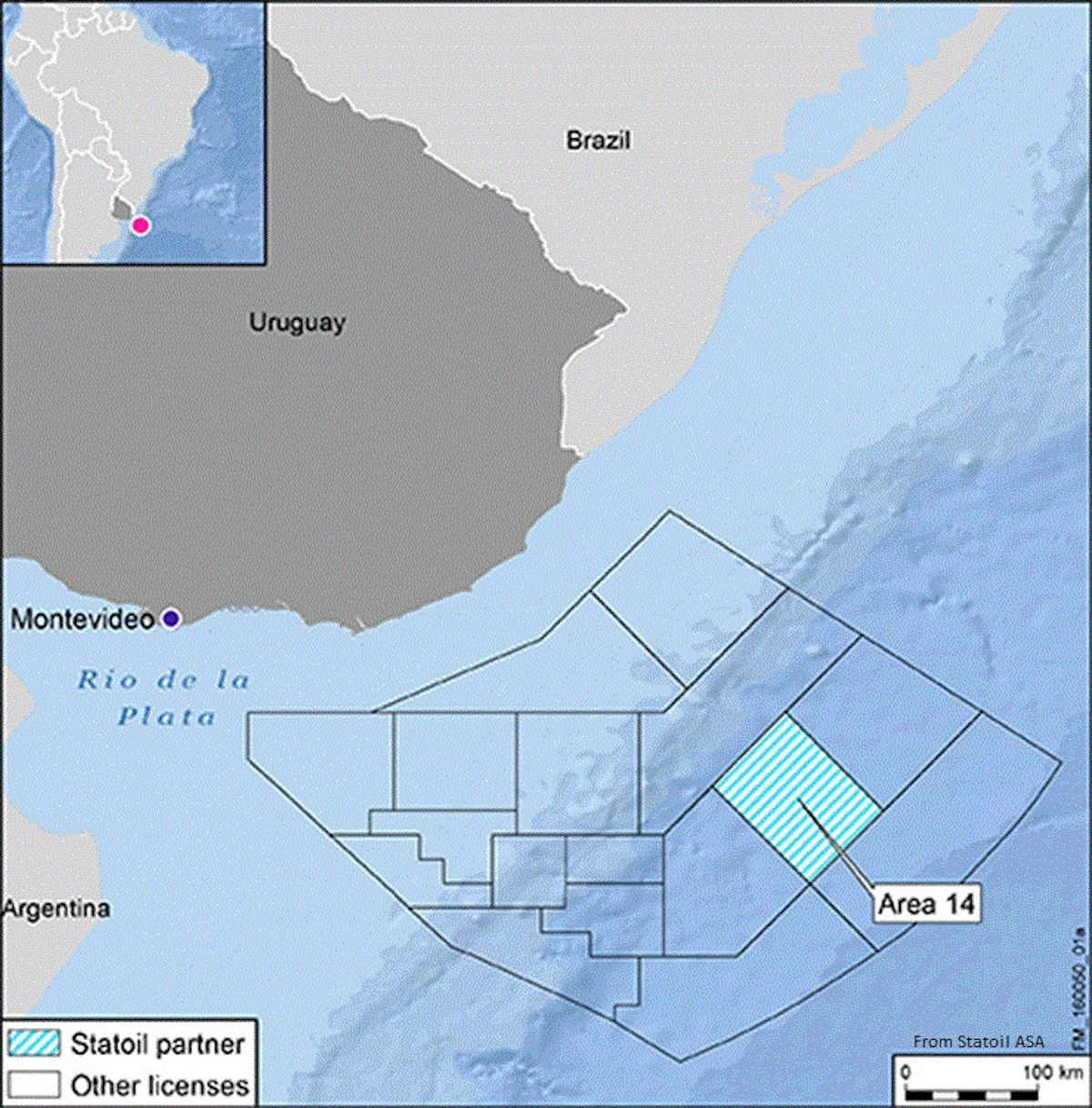Offshore Drilling In Uruguay: The Search For Black Gold And Its Challenges

Table of Contents
Uruguay's Offshore Oil and Gas Potential
Uruguay's offshore areas hold significant promise for oil and gas exploration. Recent geological surveys and exploration activities have identified several promising blocks with potential hydrocarbon reserves.
Geological Surveys and Exploration Activities
Extensive geological surveys, primarily conducted by ANCAP (Administración Nacional de Combustibles, Alcohol y Portland), Uruguay's state-owned oil company, have revealed several areas with potential for significant hydrocarbon deposits. These surveys utilize advanced seismic imaging and other exploration techniques to map subsurface formations.
- Block 1 and Block 2: These offshore blocks, located in the Uruguayan Basin, have shown promising indications of petroleum systems, attracting the interest of several international energy companies.
- Exploration Licenses: Several exploration licenses have been awarded, allowing companies to conduct further seismic surveys, drilling, and assessment of the potential reserves. Detailed reports are often confidential until specific findings are announced.
- Estimated Reserves: While precise figures remain undisclosed, preliminary estimates suggest potentially substantial reserves of oil and natural gas, which could significantly impact Uruguay's energy independence and economic outlook.
Economic Implications of Successful Exploration
The successful exploration and extraction of oil and gas reserves in Uruguay could have profound economic implications:
- Job Creation: Offshore drilling operations create numerous high-skilled jobs in areas such as engineering, geology, and maritime operations. Supporting industries also benefit, generating further employment opportunities.
- Revenue Generation: Royalties and taxes from offshore oil and gas production would bring substantial revenue to the Uruguayan government, boosting public finances and funding crucial infrastructure projects.
- Foreign Investment: Offshore drilling projects attract significant foreign direct investment (FDI), accelerating economic growth and technological advancements within the country.
- Economic Diversification: Successful offshore exploration would help diversify Uruguay's economy, reducing its reliance on traditional sectors like agriculture and tourism. This diversification strengthens economic resilience.
- Infrastructure Development: Significant investment in port infrastructure, transportation networks, and related facilities will be necessary to support offshore drilling activities, creating further economic opportunities.
Environmental Concerns and Regulatory Framework
While the potential economic benefits of offshore drilling in Uruguay are significant, environmental concerns must be carefully addressed.
Protecting Uruguay's Marine Environment
Offshore drilling poses several environmental risks:
- Oil Spills: The potential for oil spills is a major concern, causing devastating damage to marine ecosystems, coastal communities, and tourism.
- Habitat Destruction: Drilling operations can directly damage benthic habitats (sea floor ecosystems), impacting biodiversity. Noise pollution from drilling also affects marine life.
- Noise Pollution: The noise generated during exploration and extraction can disrupt marine mammals, fish, and other species, affecting their communication, navigation, and feeding patterns.
Uruguay's government has implemented a regulatory framework to mitigate these risks:
- Environmental Impact Assessments (EIAs): Stringent EIAs are mandatory before any offshore drilling project can commence. These assessments must meticulously evaluate potential environmental impacts and propose mitigation measures.
- Contingency Plans: Companies are required to develop robust contingency plans to address potential oil spills and other environmental emergencies.
- Monitoring and Enforcement: Ongoing monitoring and enforcement of environmental regulations are crucial to ensure compliance and minimize environmental damage.
International Best Practices and Sustainability
Uruguay can leverage international best practices to minimize the environmental impact of offshore drilling:
- Spill Prevention, Response, and Mitigation (SPRM) Technologies: Adoption of advanced SPRM technologies is critical to preventing and responding to potential spills effectively.
- Sustainable Drilling Practices: Implementing sustainable drilling practices, including minimizing waste, reducing emissions, and utilizing environmentally friendly technologies, is essential.
- International Collaboration: Collaboration with international organizations and adherence to international agreements and standards will contribute to responsible offshore drilling practices.
Challenges and Opportunities for Offshore Drilling in Uruguay
Despite the potential, significant challenges need to be addressed for successful offshore drilling in Uruguay.
Technological Challenges and Infrastructure Requirements
Uruguay's offshore environment presents specific technological challenges:
- Water Depths: The water depths in some prospective areas are considerable, requiring specialized equipment and techniques for drilling and extraction.
- Weather Conditions: Uruguay's weather can be unpredictable, affecting operational efficiency and safety.
- Infrastructure Development: Significant investments in port infrastructure, specialized vessels, and support facilities are needed to support offshore drilling activities.
- High Costs: Offshore drilling operations are capital-intensive, requiring substantial financial resources and expertise.
Political and Regulatory Hurdles
Navigating the political and regulatory landscape is crucial for successful offshore drilling in Uruguay:
- Licensing Procedures: Clear and efficient licensing procedures are needed to attract investment and accelerate project development.
- Government Regulation: A stable and supportive regulatory framework is essential to provide certainty for investors and protect the environment.
- Public Opinion: Addressing public concerns and fostering transparency will enhance social acceptance of offshore drilling projects.
- Policy Improvements: Streamlining regulations and creating incentives for investment can significantly attract international participation in offshore exploration.
Conclusion
Offshore drilling in Uruguay presents a significant opportunity to boost the nation's economy and enhance energy security. However, realizing this potential requires a balanced approach that prioritizes both economic development and environmental protection. By implementing robust environmental regulations, embracing international best practices, and fostering a transparent and collaborative environment, Uruguay can unlock the full potential of offshore drilling while safeguarding its precious marine ecosystems. Further research and responsible development of Uruguay's offshore resources are crucial for the nation's future. By addressing environmental concerns and embracing sustainable practices, Uruguay can unlock the full potential of offshore drilling while safeguarding its precious marine environment. The future of offshore drilling in Uruguay depends on a collaborative and transparent approach that prioritizes both economic prosperity and environmental stewardship.

Featured Posts
-
 Ines Reg Et Chantal Ladesou Les Coulisses Tendues De Mask Singer Devoilees
May 12, 2025
Ines Reg Et Chantal Ladesou Les Coulisses Tendues De Mask Singer Devoilees
May 12, 2025 -
 Prince Andrews Temper Explosive Revelations From Palace Staff
May 12, 2025
Prince Andrews Temper Explosive Revelations From Palace Staff
May 12, 2025 -
 Champ Ready Stadium Track Gets A New Surface
May 12, 2025
Champ Ready Stadium Track Gets A New Surface
May 12, 2025 -
 Royal Honors Row Pvv Ministers Veto Sparks Debate
May 12, 2025
Royal Honors Row Pvv Ministers Veto Sparks Debate
May 12, 2025 -
 Netherlands Extends Border Checks Despite Fewer Arrests And Asylum Claims
May 12, 2025
Netherlands Extends Border Checks Despite Fewer Arrests And Asylum Claims
May 12, 2025
